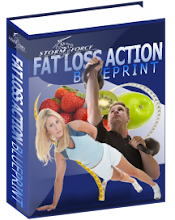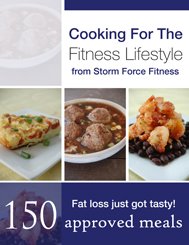Following on from my interview with Craig Ballantyne, I hooked up with world-renowned coach Alwyn Cosgrove.
If you've never heard of this guy, I strongly suggest you google him and see what you find!
I've yet to find someone who gets such strong points across INSTANTLY!
Let's see what he had to say about periodising your training, nutrition, carbs and which people influenced him throughout life....
********************
JLT: Hi Alwyn thanks for taking time out of your busy schedule to chat strength, conditioning and fat loss with me. I know your straight up attitude is something a lot of people have warmed to and admire, myself included!
AC: No problem, Jon
JLT: Now, I love spending time with people who just want fast results without all the unnecessary trimmings. However, sometimes there is a need to go beyond just ‘working out hard’ all the time.
What are your thoughts on periodisation, in particular linear versus
undulating versus the conjugate model when it comes to getting an
athlete or Joe Public in top shape? Does it depend on the individual and their sport or is there one best way in your opinion?
AC: Well, it depends on a lot of variables. For the general population with general goals, usually fat loss, an alternating linear approach seems to work best. In other words Weeks 1-4 we would work with sets of 12 reps, Weeks 5-8, 8 reps, Weeks 9-12: 10 reps, Weeks 13-16: 6 reps.
For general strength, the science has shown undulating periodization to be superior, but the same researchers showed it to be less effective for muscular endurance.
The conjugate system works well for athletes who need to peak multiple times
or have long seasons, but in our experience the rate of progress is somewhat
slower and requires more recovery.
As with most things – there’s never one right answer.
JLT: Awesome thanks for that! Take note readers again we have another expert confirming that you shouldn’t be searching for that perfect program. The perfect program for your next door neighbour may not be for you.
AC: Precisely.
JLT: Moving on do you think periodisation or cycling practices should be applied to nutrition as well or do you believe you have a set of rules which must be applied all year round for top results?
AC: You may have heard me say before that methods are many, principles are few, methods may change, principles never do.
We use the same principles year round and look for 80-90% compliance to the
principles. We may add extra “rules” for weight class athletes or when
someone is peaking but it’s always the same philosophy.
(These principles can be found here)
JLT: My thoughts exactly – everyone’s always looking for ‘new’ when it’s adhering to the proven stuff that gets the job done. What are your views on carbohydrates? Do you agree with only eating carbs after training, before and after training?
AC: For fat loss it’s a very effective strategy, for hypertophy then it’s
overly restrictive as we need to be getting sufficient calories in to stimulate muscle growth.
JLT: Right so would you ever cycle carb intake with individuals such as low-medium-high days?
AC: We have used it but we don’t emphasize carb cycling too much to be
honest.
I can see the effectiveness of it, but in our experience it hasn't been that much more effective in the average client over time - and for most of them it creates too much hassle and stress. Using a 90% compliance to a set of principles allows flexibility and more "life".
JLT: So again we’re saying that compliance with a good program is better than half-hearted efforts at perfectly designed nutrition and training strategies especially in the general public looking for all-round results and fat loss.
Back to training…what are your views on deloading from training and why? For instance do you recommend every 4th week as a light week, every 6th week as
complete rest etc or do you believe simply taking enough rest during
each week is enough?*
AC: We start a new program every four weeks and we use week one as a deload
week – when we teach the new exercises.
The new stimulus is usually enough to create forward progress, so we reduce the volume and intensity that week.
It’s always worked better with our clients than deloading in later weeks.
So week one: introduction week, week two: base week, week three: overload
week, week four: shock week - then week five we start over with a new
routine but it's intro week so volume is reduced.
I like a half week off after 8 weeks of uninterrupted training.
Basically on a 3 days per week split such as Monday, Wednesday, Friday - you'd just miss one workout and then a full week off after 16 weeks.
Again on a MWF SPLIT, you'd miss Wed and Fri and get back to the gym the next monday - so it's seven days not nine days as some people do it.
JLT: Interesting – that would work well and I could see how using a kind of teaching week would be very effective especially for beginners. I like to use ‘practice days’ along the way for certain individuals and programs which give recovery time but enable you to accelerate gains on exercises you need to work at.
AC: Yes that would work too but we still need some extended recovery breaks.
JLT: Definitely, as we said earlier it’s all about the individuals especially as some beginners just don’t train hard enough to warrant long rest breaks!
Right Alwyn, once you’ve had a tough training sessions, what are your top post-training recovery methods in terms of dynamic versus static stretching, ice baths, cold showers, power naps etc. How do you make sure the individual is in top condition for the next session?
AC: Static stretching, foam rolling and post workout nutrition are going to
be 90% of the picture.
That will address the quality of the muscle tissue (the density) and the length and tension, while feeding the system.
A recovery strategy has to be built around the training strategy – it’s hard
to answer this question without a specific training regimen in mind.
JLT: Fair enough we don’t want to be putting any more generic advice out into the fitness world! Let’s move on to your career and progression.
What are the biggest mistakes you made in your early days with clients
in terms of your approaches to nutrition, training and the mental
aspects of getting results?
AC: I don’t think I made any mistakes per se.
I always worked as hard as I could and did the best I knew how. We have just learned more.
For example we all thought that high carb low fat diets were the best, aerobics was
best for fat loss, crunches were good for abdominal work etc.
We weren’t making mistakes – we just learned more!
I think of what we do similar to medicine. If you were a doctor who prescribed a drug to patients in the 80’s and subsequent studies in 2009 found a better, safer, more effective drug – then you’d change.
It doesn’t mean you made a mistake before – we just know more now. you're only making a mistake if you don't stay current.
JLT: Yeah I’m glad you said that because it makes me sad when people get so attached to a particular method that they refuse to consider an alternative no matter how long it has failed to produce results!
AC: Exactly, at the end of the day you need to keep reassessing and testing to keep improving. That rule applies to the average gym member trying to lose fat as well as us as coaches.
JLT: For sure, now your famous for your ah-ha moments amongst other things! What are your five biggest ‘ah-ha’ moments which really shaped the direction of your training philosophies?
AC: Well my Top 5 ah-ha moments can be found on T-Nation – go check them out as there’s too much to go through again here!
http://www.t-nation.com/free_online_article/sports_body_training_performance/cosgroves_five_ahha_moments
Aside from that article, the realization that I had more people in my facility on any given program than most research studies had enrolled really forced me to analyze and look at the data we were collecting. That really refined our programming over time as we were getting so much data on a regular basis!
JLT: So we should always take ‘science’ with a pinch of salt and test for ourselves?
AC: Yes, I’m not saying scientific research isn’t necessary - that would be stupid - but never just accept things as gospel!
JLT: Okay good advice! Next question…who has had the most profound effect on your career or life in general so far and why?
AC: When I was in high school in Livingston I was in Higher mathematics class. I
have no idea how I got there as I was clearly the dumbest kid in the class!
Sat next to me in the class was a guy, Keith Wilson who spent his spare time (at 14 years old) working for a company converting the program code for an arcade computer game to a home version. He used to hand in his homework on a floppy disk.
Me? I was drawing sharks on the back of my notebook.
So while studying quadratic equations, (something that has been oh-so-useful in my life...) it was clear that I didn't understand it. I asked the teacher to go over it again.
He sighed an exasperated sigh - but he went over it again.
I still didn't get it.
So I asked again. The teacher sighed loudly and said "Okay - the rest of you take a five minute break while I go over this again for Alwyn's benefit....." and then mumbled "for whatever good that will do"
Obviously I felt pretty small at that point. And of course the whole class heard him and laughed.
And I still didn't get it.
And I never asked a question to this teacher again.
And I failed the exam for the class.
This teacher was a man who had a chance to make a kid feel better and help him, or put him down and make him feel worthless. He chose the latter. Why? Just because he could. That's the kind of person he was.
Another person in my life was my Taekwon-do instructor - Derek Campbell. My Dad was made unemployed and we could no longer afford lessons. I went to my instructor and told him that we just couldn't afford lessons anymore and I'd be back when my Dad got a job.
He told me to show up early for the next class and become his assistant - teaching beginners. He would pay me with free lessons.
I went on to become a fourth degree black belt, and seven time UK national champion as a result.
This teacher was also a man who had a chance to make a kid feel better and help him, or put him down and make him feel worthless. He chose the former.
Why? Just because he could. That's the kind of person he was. He changed the
course of my life.
One person changed a kids life and made it worse. One person changed a kid's life and made it better. I remember both of them.
We have all had, and remember these people in our lives - the only question to ask is ...
What kind of person are you?
JLT: Hmmm something worth thinking about. I always think an attitude of gratitude will eventually get you where you want to be!
AC: Yeah for sure.
JLT: Okay let’s time warp. If you were a newbie to the strength and fitness game now, what three things would you prioritise to accelerate the success of both yourself as a trainer and your clients’ results?
AC:
1) Be the best.
The difference between where you are now, and where you want to be can
usually be closed by education. Who do you need to meet? Who do you need to
intern with? What books do you need to read? What DVD’s do you need to
watch? What seminars do you need to attend? Make a list and start checking
them off.
JLT: Education all the way! I think that applies to general fitness fanatics as well.
I love the phrase ‘Give a man a fish and you feed him for a day, teach him how to fish and you feed him for a lifetime.’
People need to stop hunting for cookie cutter programs and actually learn a little along the way so they can be more adaptable.
Next?
AC:
2) Understand the mindset of the client. This is something I got from Dr Kara Mohr.
Put yourself in the clients’ shoes. Try to understand what it’s like for them in their lives to make fitness a priority. That doesn’t mean you need to coddle clients or accept excuses and rationalizations, but think about what it means for a 300 lb women who is joining your gym and this is the first exercise she’s ever done.
Signing up is a huge accomplishment – these things need to be acknowledged, supported and celebrated. Having that sense of caring and understanding can take you far.
If you’re a trainer - are you in the best shape of your life?
How many trainers reading this are in the greatest shape of their lives
right now?
How many are extremely happy with their own fitness?
How many trainers hire and use another trainer?
We know how valuable and useful a trainer can be to someone? Yet most trainers don't use one. Why? You don’t need one? Does a doctor need another doctor? Does a hairdresser cut their own hair?
Why do you think you don't need one? Think of all those reasons and understand that the prospective client thinks that too. They don't know what you know - and they still feel that "they'll hire you once they lose ten pounds".
Most trainers don't understand the mindset of the client or prospect.
JLT: Wow I like that! Fat trainers annoy me. What else?
AC:
3) Continue to “sharpen the saw” by investing in yourself on an ongoing basis
The only thing worse than not attending a seminar in the last three months is not attending a seminar and thinking that it doesn’t matter.
When you decide to stop learning (and it IS a decision) you will stop growing and you will stop earning.
JLT: Okay food for thought and I better go find a seminar to go to….
Let’s finish off with what are the three things or people you wish would vanish off the face of the fitness industry forever?
AC: Seriously? The fitness industry?
I don’t care.
I focus on doing a great job with my clients and that’s really all you can focus on.
There isn’t anything in the fitness industry that bugs me too much. I guess the
in-fighting that seems to go on bothers me a little but to be blunt, I’m too
busy to even think about that kind of stuff.
I’d like it if we could get rid of cancer, but getting rid of step aerobic instructors doesn’t really concern me.
JLT: Wise words. I think even if you’re not a trainer and you’re taking in this interview, you need to think about that. Focus on what gets you results and forget about trying to take down other people. If you’re getting good results tell people how, if you’re not, you’ve got other priorities right now!
AC: Exactly. Learn how to get results then share the knowledge!
JLT: Right let’s wrap it up there. Alwyn thanks for your time - there’s a lot to think about there for trainers and fitness fans alike. Can you tell us where can people find out more about your methods and philosophies?
AC: No problem. They can check out http://www.alwyncosgrove.com
Note - To find out more about periodization and what it means, check out Alwyn’s article
-





4 comments:
Absolutely terrific interview, Jon! Alwyn Cosgrove is one of my favorites.
You keep 'hitting 'em out of the park'...first CB, now AC...and JLT all the time! Can't ask for more than that!
Thanks so much, Jon!
-Fred
No problem - let me know if anyone else interests you and I'll see if I can get hold of them!
Jon
Great interview. I always recommend Cosgrove to endurance athletes I know for a great "eye opener".
Jon,
You've got great interviewing skills! Nice work, and even better that it was with Alwyn -- he's always got some good things to teach.
Thank you.
Christopher
Post a Comment